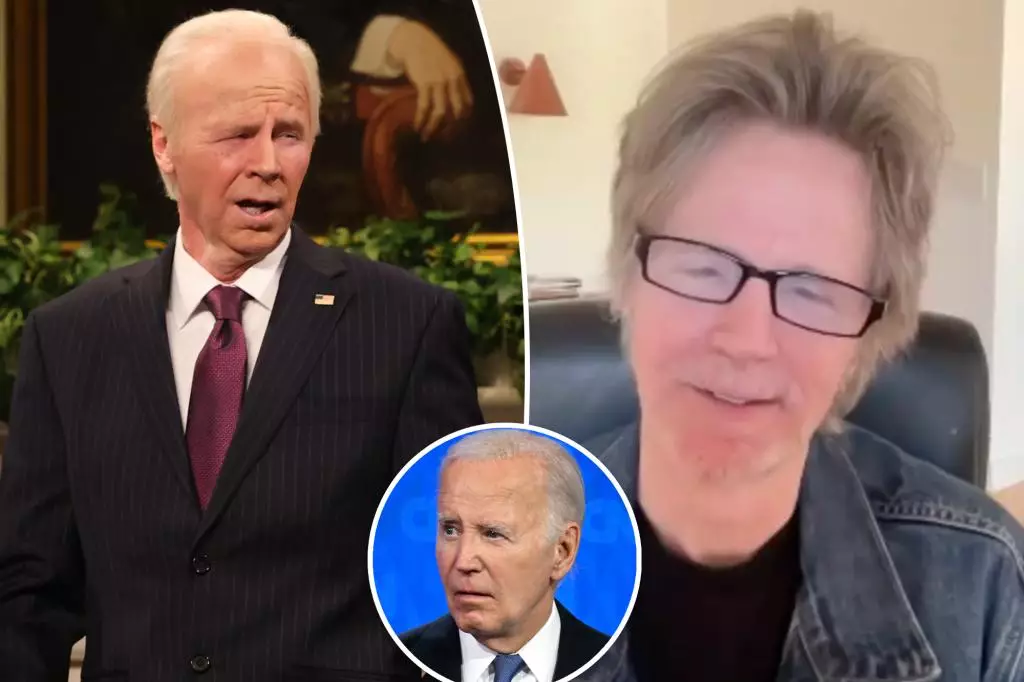Dana Carvey, a name synonymous with sharp wit and brilliant impersonations, has made an indelible mark on the world of comedy, particularly through his iconic tenure on “Saturday Night Live” (SNL). In a recent revelation, Carvey opened up about his return to SNL to facilitate a comedic take on former President Joe Biden, revealing the nuanced relationship between humor and politicking. His candidness not only highlights the challenges of political impersonations but also sheds light on the delicate balance comedians must maintain while poking fun at public figures.
Carvey’s journey into this politically charged comedic arena began when he received a call from Lorne Michaels, the powerhouse behind SNL, who managed to convince him to step back into the spotlight for a six-week stint in New York City. While engaging in impersonation may seem like a lighthearted affair, Carvey has consistently contended that it’s a form of artistry requiring meticulous attention to detail. Every nuance in his portrayal of Biden, from mannerisms to facial quirks, is crafted not simply for a laugh but to ensure that the humor is constructive rather than derisive.
Comedy as a Reflection of Society
The act of imitating a sitting president is not merely about the punchlines; it acts as a commentary on the political landscape itself. Carvey experienced an immediate shift in circumstances when Biden’s performance in a key debate prompted a reevaluation of his role. Flashing back to a moment during that debate, Carvey recalls a palpable sense of foreboding, whispering to his wife, “We’re not going to New York,” predicting an end to his impersonation before it even began. His intuitive grasp of public sentiment is indicative of a comedian’s skill in reading the room, an essential element in delivering meaningful satire.
Throughout his multifaceted career, Carvey has never aimed to degrade the figures he’s portrayed; rather, his intent is to extract the humor from their humanity. He emphasizes that his impersonations resemble “threading a needle,” suggesting a careful consideration of tone. By focusing on the amusing quirks rather than the more serious aspects, Carvey showcases an intriguing point—good comedy can help us navigate the complexity of political landscapes in a healthier and more accessible way.
Building Connections Through Humor
Carvey’s interactions with former politicians like George H.W. Bush illustrate the intriguing dynamic between comedians and their subjects. Carvey’s impersonation of Bush was not merely a source of humor; it fostered a unique relationship that culminated in an unexpected invitation to the White House. Such stories reveal that at their best, impersonations can break down barriers between the entertainment industry and politics. In Carvey’s experience, humor acted as a bridge, enhancing public engagement with figures who often seem distant from everyday life.
What makes Carvey’s craft compelling is not just his ability to mimic; it’s his underlying philosophy that respects the humanity of those he portrays. He acknowledges that he genuinely likes the people he imitates, which is perhaps why audiences are drawn to his work. Unlike comedians who rely solely on mockery, Carvey’s approach fosters empathy, allowing viewers to see the lighter side of otherwise serious figures.
The Legacy of a Comedic Luminary
Beyond SNL, Carvey’s current ventures, such as co-hosting a podcast with David Spade, further amplify his storytelling prowess and commitment to the entertainment industry. These opportunities underscore a crucial evolution in the comedian’s career—not only entertaining but also engaging in conversations that resonate with the contemporary audience. By recollecting his rich history while discussing current events, Carvey demonstrates that comedy remains a vital tool in addressing the social and political climate.
Ultimately, Dana Carvey’s artistry as a comedian, particularly in navigating the intricate world of political satire, exemplifies a powerful intersection of humor and humanity. His talent lies in transforming the absurdities of politics into something both accessible and entertaining, all while preserving the dignity of those in power. As we reflect on Carvey’s contributions to comedy and the art of impersonation, it becomes clear that in humor, we find not only laughter but also a pathway towards deeper understanding and connection.

Leave a Reply